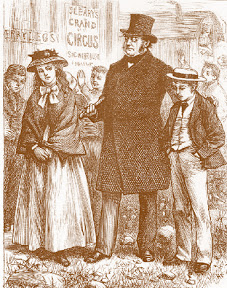 Many Christians are apt to be just a little bit churlish when it comes to Christmas. I sometimes get a sense that Christians are resentful that “our” festival has been stolen, taken over by revellers who are happy to sing carols and watch a school nativity play but will give little or no thought to the gospel for the rest of the year. Jesus is for life, not just for Christmas. We have a particular problem with Father Christmas (or Santa Claus, if you must). Never a year goes by without some story in the news of a conflict between the church and one of her most widely celebrated saints. I have spoken to many Christians over the years who have tied themselves up in knots over whether to allow their children to enjoy this particular bit of fairytale. Here’s a blogging friend from a while ago: (sadly, I can’t link the original post):
Many Christians are apt to be just a little bit churlish when it comes to Christmas. I sometimes get a sense that Christians are resentful that “our” festival has been stolen, taken over by revellers who are happy to sing carols and watch a school nativity play but will give little or no thought to the gospel for the rest of the year. Jesus is for life, not just for Christmas. We have a particular problem with Father Christmas (or Santa Claus, if you must). Never a year goes by without some story in the news of a conflict between the church and one of her most widely celebrated saints. I have spoken to many Christians over the years who have tied themselves up in knots over whether to allow their children to enjoy this particular bit of fairytale. Here’s a blogging friend from a while ago: (sadly, I can’t link the original post):
For good measure, we even celebrate Santa and one of the most significant Godly holidays on the same day. Is it any wonder that a child’s perception of God can often get tangled up in the mythical character of Mr. Claus? For Christians this poses an obvious problem. Children are taught to believe in both, and when the non-existence of Santa becomes a reality in adolescence, God will likewise get scrutinized. The blatant lying to children about a figure they already associate with God cannot yield beneficial results. Anecdotally, I know of a number of folks who resent their parents lying to them about Santa, and if they lied about Santa, the belief is that they lied about God, too. I am of the very un-festive opinion that lying to your children about anything is bound to have negative consequences, but particularly when it involves a figure like Santa.
 We should stick to what Christmas is all about. Like Dickens’ Gradgrind, we should confine ourselves to the facts. “Bah, humbug!” (to change my Dickensian reference) to the rest. Attitudes like this are a terrible shame, or so they seem to me. Children are creatures of wonder and imagination, both qualities which can nurture faith in the Living God. They thrive on storytelling and their world is naturally full of what we adults, poverty-stricken by reason, regard as naive personifications. One morning on our walk up to school, my then 6 year old daughter asked me: “Daddy, why does Jack Frost come?” Should I have scotched this bit of her mythology fearing for the development of her scientific mind? After all, she had already decided she wants to be a doctor. Perhaps I should have explained that frost is spicules of ice which form on solid surfaces when they are chilled below the deposition point. It is never too early to start thinking about physics! But I confess, I simply said that Jack Frost comes when it is cold. That seemed to do. Likewise with Father Christmas. He has a place in our family storytelling, part of the mythology we share. To suggest that this amounts to lying to our children is as ludicrous as the notion that the ‘facts’ of the Nativity can be easily and plainly stated. I was reminded recently that ‘gospel’ was, in Old English, ‘godspel’ and, though I am sure that this is etymologically unsound, I am taken with the idea that the incarnation of Jesus is “God’s spell” — a moment so wondrous that it takes imagination, not reason, to apprehend it. Of course I’m not here arguing for abandoning the achievements of the Enlightenment, for discarding reason entirely in favour of mythology and superstition. But perhaps Christians before all others should recognize that stories, imagination and wonder are a vital part of our lives. Let’s not deprive our children of them too readily.
We should stick to what Christmas is all about. Like Dickens’ Gradgrind, we should confine ourselves to the facts. “Bah, humbug!” (to change my Dickensian reference) to the rest. Attitudes like this are a terrible shame, or so they seem to me. Children are creatures of wonder and imagination, both qualities which can nurture faith in the Living God. They thrive on storytelling and their world is naturally full of what we adults, poverty-stricken by reason, regard as naive personifications. One morning on our walk up to school, my then 6 year old daughter asked me: “Daddy, why does Jack Frost come?” Should I have scotched this bit of her mythology fearing for the development of her scientific mind? After all, she had already decided she wants to be a doctor. Perhaps I should have explained that frost is spicules of ice which form on solid surfaces when they are chilled below the deposition point. It is never too early to start thinking about physics! But I confess, I simply said that Jack Frost comes when it is cold. That seemed to do. Likewise with Father Christmas. He has a place in our family storytelling, part of the mythology we share. To suggest that this amounts to lying to our children is as ludicrous as the notion that the ‘facts’ of the Nativity can be easily and plainly stated. I was reminded recently that ‘gospel’ was, in Old English, ‘godspel’ and, though I am sure that this is etymologically unsound, I am taken with the idea that the incarnation of Jesus is “God’s spell” — a moment so wondrous that it takes imagination, not reason, to apprehend it. Of course I’m not here arguing for abandoning the achievements of the Enlightenment, for discarding reason entirely in favour of mythology and superstition. But perhaps Christians before all others should recognize that stories, imagination and wonder are a vital part of our lives. Let’s not deprive our children of them too readily.
Leave a Reply